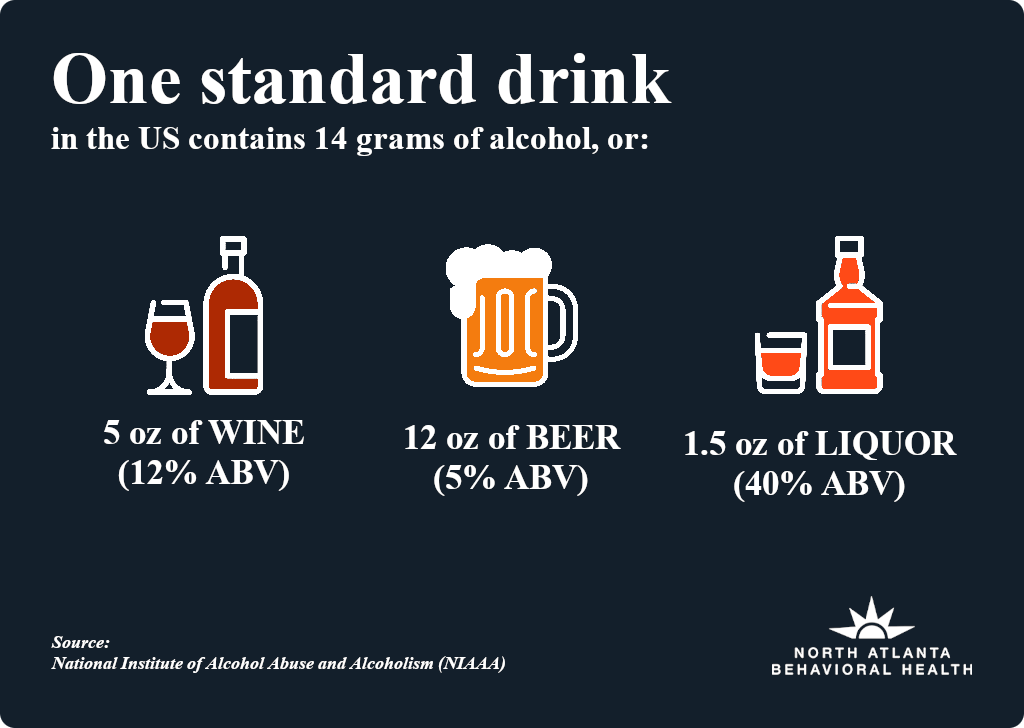
Contents
Find Rehab in Georgia
Addiction cannot be treated by treating the symptoms alone. We use holistic and evidence-based methods to treat the entire individual.
How long alcohol can stay in your system depends on many factors. For instance, your weight and biological sex can influence how long it takes your body to metabolize alcohol. Other factors include your diet, age, and liver health. However, above all, the amount of alcohol you drink will greatly impact how long alcohol will remain in your system.
If you are concerned about your own or a loved one’s drinking, there is hope for recovery from alcohol addiction. North Atlanta Behavioral Health can help you or your loved one at our alcohol rehab in Georgia.
How Long Does Alcohol Stay in Your System?
Alcohol can stay in your system for hours or days depending on factors unique to you and your drinking habits. These factors influence your blood alcohol concentration (BAC)—the percentage of alcohol in your bloodstream. In brief, according to Alcohol Research & Health, “BAC is determined by how quickly alcohol is absorbed, distributed, metabolized, and excreted.”
The factors influencing your BAC include the following:
- Amount of food and water you’ve consumed
- How much alcohol you’ve had
- The alcohol content in each drink
- Biological sex
- Body weight
- Your tolerance for alcohol
- Metabolic rate
- Your general state of health
- Liver health
- Mixing medications or other drugs with alcohol
All of these factors can influence how long alcohol will stay in your system, which is why the answer is not straightforward. The higher a person’s BAC, the longer it will take your body to rid itself of alcohol. However, you can estimate the length of this process on the time it takes to metabolize a standard drink.
What is a Standard Drink?
When talking about how long alcohol stays in your system, it is important to define a standard drink. In the US, a standard drink contains about 14 grams of alcohol, according to the National Institute of Alcohol Abuse and Alcoholism (NIAAA). This is equivalent to:
- 12 ounces of beer with a 5% ABV (alcohol by volume)
- 5 ounces of wine with a 12% ABV
- 1.5 ounces of liquor with a 40% ABV
Thus, the standard drink doesn’t mean a glass of any wine, beer, or liquor because some brands and types of drinks have higher or lower ABVs than others. For example, craft beers often have an ABV higher than the standard rate—around 6%-10% or more. So, one 12-ounce beer with an ABV of 10% is twice the standard amount of alcohol.
Generally speaking, it will take about one hour per standard drink for your body to rid itself of alcohol. In the example mentioned above, this means that 12 ounces of a 10% ABV craft beer is equal to two standard drinks. Therefore, one beer with 10% ABV will take two hours to leave your system. The reason it takes this long is the way your body rids itself of alcohol.

How Does Your Body Rid Itself of Alcohol?
Your body rids itself of alcohol primarily by processing it through the liver. According to The BMJ, “More than 90% of alcohol is eliminated by the liver; 2-5% is excreted unchanged in urine, sweat, or breath.” The liver breaks down alcohol naturally, however, nothing can speed up this process.
So, when a person consumes alcohol faster than the liver can metabolize (break down) the alcohol, the unprocessed alcohol will remain in their system. That is why drinks with ABVs above the standard, as well as drinking quickly, lead to a higher BAC and level of intoxication.
Can You Get Alcohol Out of Your System Quickly?
Simply put, there is no way to get alcohol out of your system quickly. You cannot speed up the process it takes the liver to process alcohol. Many myths about this idea include drinking black coffee, taking a cold shower, or getting fresh air to help a person “sober up.”
You can only wait for your liver to metabolize alcohol naturally. Furthermore, your liver health and age could factor into how long it takes to process alcohol. Until then, alcohol can be detected in your body.
How Do You Detect Alcohol in Your System?
Detecting alcohol in your system requires some type of testing. You can’t tell just by outward appearance or visible signs of intoxication. This is because a person’s tolerance to the effects of alcohol varies. For instance, if you drink only once a month, you are more likely to show signs of intoxication than someone who drinks regularly—even if you have the same amount.
To measure your blood alcohol concentration (BAC), you will need to take a drug and alcohol test. The most common tests include:
- Breathalizers: Alcohol can remain in a person’s breath for about 24 hours. However, breathalizers aren’t the best for determining a person’s BAC accurately. Instead, a breathalyzer provides a quick estimate, which is why law enforcement officers use these during field sobriety tests.
- Urine Test: As your body processes alcohol, it produces alcohol metabolites. While you feel sober, a urine test can still detect alcohol metabolites in your system. Most tests are good for detecting alcohol 24 hours after your last drink, but advanced tests can detect trace amounts up to 72 hours after drinking.
- Saliva Test: Alcohol will remain in the saliva for about 24 hours after your last drink. A saliva test is accurate at determining a BAC from recent alcohol consumption.
- Blood Test: Testing the blood itself for BAC yields some of the most accurate results. Blood tests can detect alcohol about 24 hours after consumption.
- Hair Samples: Testing a hair sample is not a common way to detect alcohol in a person’s system. Most alcohol testing determines a person’s current or recent level of intoxication. A hair sample could detect alcohol up to 3 months after drinking.
Testing for alcohol in your system is common for employee screening and determining a person’s ability to drive or operate machinery. Additionally, drug and alcohol rehab programs, like outpatient rehab and sober living homes, often use alcohol tests to keep clients accountable for their sobriety.
Overcome Addiction with evidence-based, expert care.
How Does Biological Sex Affect Alcohol Intoxication?
Biological sex can affect your level of alcohol intoxication. It can also be a factor in how long alcohol will stay in your system. Women tend to have a lower tolerance for alcohol than men because of the differences in body composition between men and women. Relatively speaking, men and women have different amounts of body fat and blood volume.
According to the above-mentioned article in The BMJ, “Very little alcohol enters fat because of fat’s poor solubility. Blood and tissue concentrations are therefore higher in women, who have more subcutaneous fat and a smaller blood volume, than in men, even when the amount of alcohol consumed is adjusted for body weight.” In addition, menstrual cycles can also factor into how alcohol is processed.
For these reasons, the Centers for Disease Control and Prevention (CDC) defines excessive alcohol consumption differently for men and women:
- Binge drinking is consuming 4 or more standard drinks per occasion for women and 5 or more drinks for men
- Heavy drinking is having 8 or more drinks per week for women and 15 or more drinks per week for men
If you consume alcohol in quantities like the ones mentioned above, you need to consider cutting back or quitting altogether. When consuming alcohol or recovering from the aftereffects takes up a majority of your time, you might have an alcohol use disorder (AUD). Alcohol rehab programs can help you get your life back on track.
Get Help for Alcohol Addiction in Georgia
Are you concerned about how much alcohol you consume? Alcohol can stay in your system for several hours and even a day or more, depending on how much you drink. If you consume alcohol excessively, you can make a change and regain control of your life.
North Atlanta Behavioral Health is here to help those struggling with alcohol abuse. Call us today to begin alcohol addiction treatment in Georgia.
Treatment Philosophy
North Atlanta Behavioral Health is dedicated to the health and happiness of our clients. We offer personalized treatment plans that put each individual's needs first.
Meet Our Team
Our multidisciplinary team wants nothing more than for our clients to achieve a lifetime of recovery and sobriety. Let us help you get the most out of treatment.



